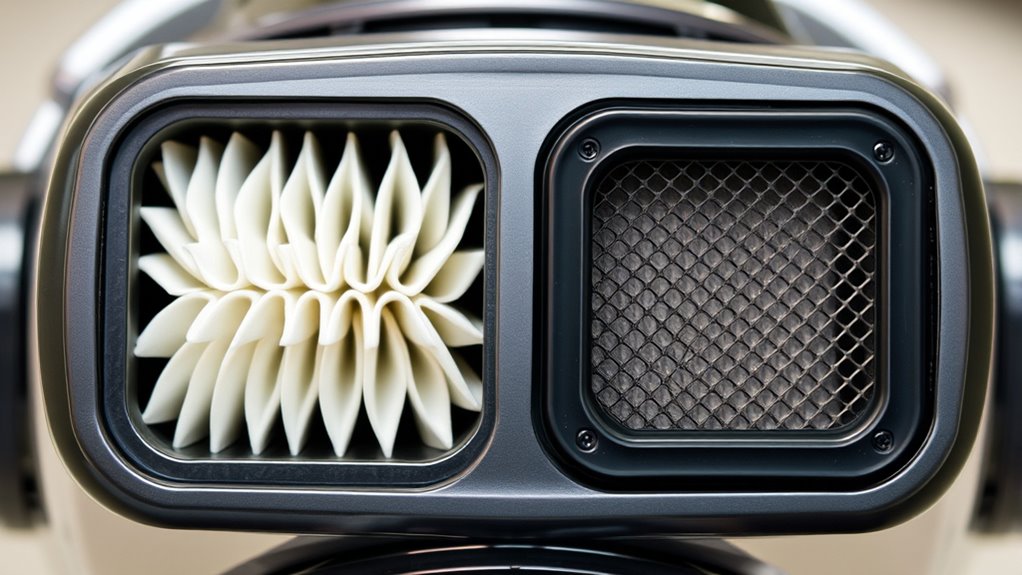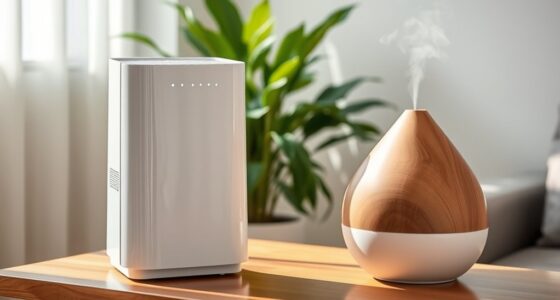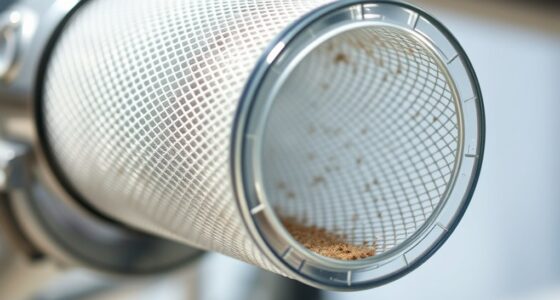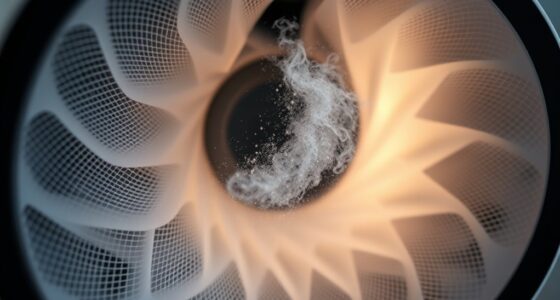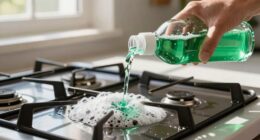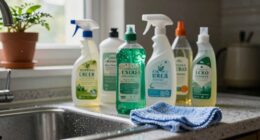When choosing between HEPA and ULPA filters for your vacuums and floor care, know that HEPA filters trap 99.97% of particles down to 0.3 microns, making them ideal for home use and allergen control. ULPA filters are more advanced, capturing 99.999% of smaller particles as tiny as 0.12 microns, perfect for critical environments. Understanding the differences can help you make smarter decisions—exploring more will reveal which option suits your needs best.
Key Takeaways
- HEPA filters trap ≥99.97% of 0.3-micron particles, while ULPA filters capture 99.999% of particles as small as 0.12 microns.
- ULPA filters are denser and more effective against microscopic contaminants, but may restrict airflow and require specialized housing.
- HEPA filters are suitable for residential vacuum cleaners for allergen removal; ULPA filters are used in industrial cleanrooms and labs.
- ULPA filters tend to have a higher upfront cost but longer lifespan; HEPA filters are more budget-friendly but need more frequent replacements.
- Proper installation and maintenance maximize filtration efficiency and lifespan; choose based on your environment’s contamination control needs.
The Basic Differences Between HEPA and ULPA Filters
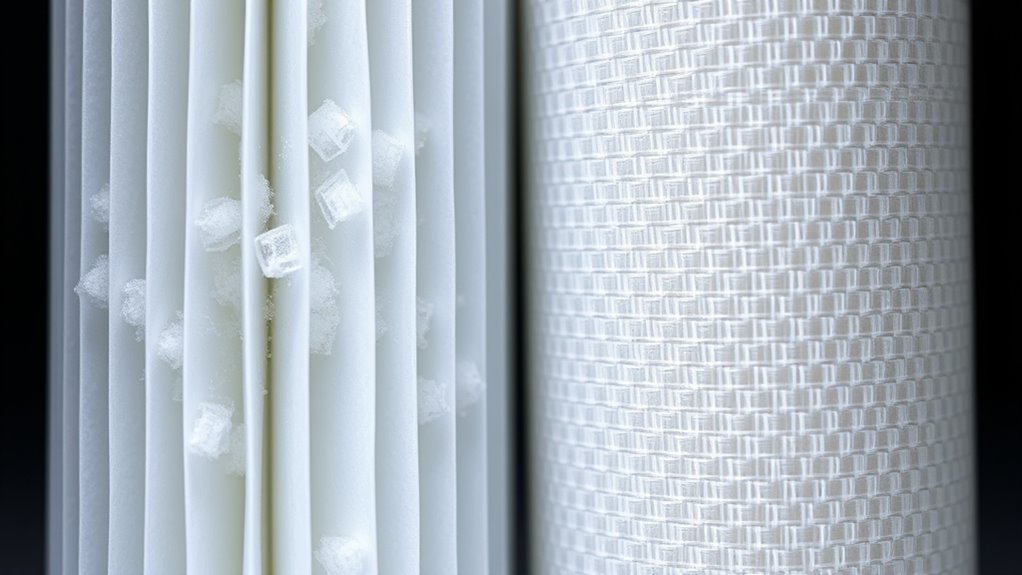
While both HEPA and ULPA filters are designed to remove airborne particles, they differ markedly in their filtration capabilities. HEPA filters are common in air purifier technology, capturing at least 99.97% of particles as small as 0.3 microns. ULPA filters go even further, trapping 99.999% of particles down to 0.12 microns, making them ideal for specialized environments. Because of their high efficiency, ULPA filters often require less frequent filter replacement, but they can be more expensive upfront. HEPA filters, while effective, may need more frequent replacements depending on usage and air quality. Your choice depends on your air purification needs, balancing filtration power and maintenance frequency for best indoor air quality. Additionally, understanding filter maintenance is crucial for ensuring optimal performance and air quality over time.
How Filtration Efficiency Is Measured in HEPA and ULPA Filters
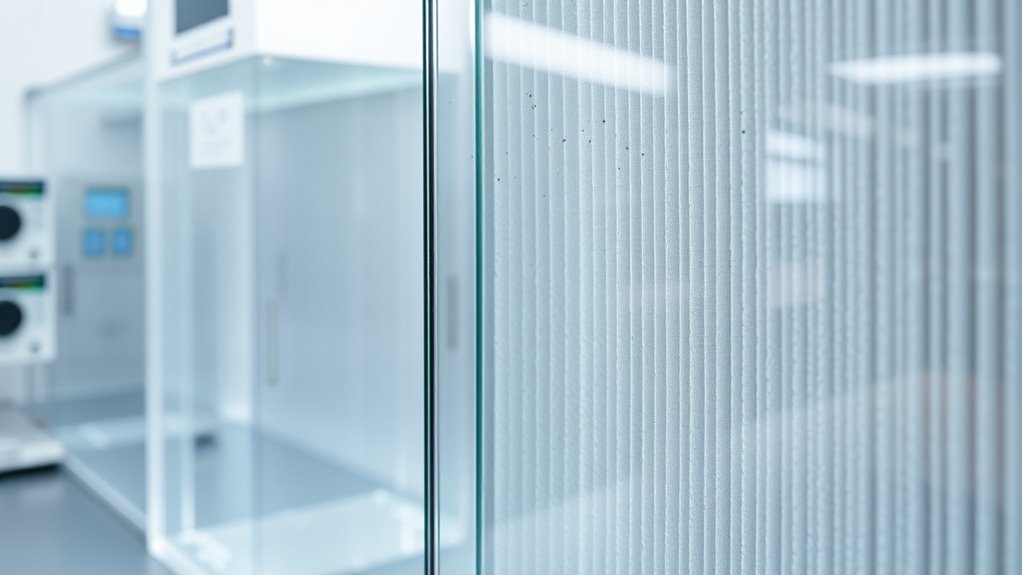
Filtration efficiency in HEPA and ULPA filters is measured through standardized testing methods that quantify how well each filter captures airborne particles. These tests use specific particle sizes and airflow rates to evaluate performance, leading to certifications that confirm filter quality. The key metrics include the percentage of particles removed and the filter’s lifespan before replacement. A higher filtration efficiency indicates better performance and longer-lasting filter certification. Additionally, understanding the filter rating system can help consumers compare and select the most suitable air filtration solution for their environment.
Common Uses and Applications for Each Filter Type

You’ll find HEPA filters commonly used in residential settings to improve indoor air quality, especially in homes with allergy sufferers. Ulpa filters, on the other hand, are essential for commercial and industrial environments that require the highest level of contamination control. Understanding these applications helps you choose the right filter for your specific needs. Additionally, family bonds and the importance of love and support can influence the care and maintenance of your vacuum filters, ensuring optimal performance.
Residential Air Filtration
Residential air filtration systems are essential for maintaining indoor air quality and ensuring a healthier living environment. If you use an air purifier, selecting the right filter impacts its effectiveness and filter lifespan. HEPA filters excel at capturing airborne particles like pollen, pet dander, and dust mites, making them ideal for allergy sufferers. ULPA filters, with their higher filtration efficiency, are suited for homes with more sensitive individuals or specific needs like smoke removal. For everyday use, HEPA filters typically last 6 to 12 months before needing replacement, while ULPA filters may require more frequent changes depending on air quality and usage. Proper upkeep ensures your air purifier remains effective, improving indoor air quality and safeguarding your health. Silly tantrums and pet antics can sometimes occur during family photoshoots, adding humor and memorable moments.
Commercial & Industrial Use
In commercial and industrial settings, choosing the right filter is essential for maintaining safety, compliance, and operational efficiency. HEPA filters excel in environments requiring high air quality, such as laboratories and cleanrooms, where they trap microscopic particles. ULPA filters are ideal for applications demanding even stricter standards, like pharmaceutical manufacturing and semiconductor production, ensuring purity and safety. Proper selection impacts air quality and filter lifespan, reducing maintenance costs and downtime. Here’s a quick comparison:
| Application | Suitable Filter Type |
|---|---|
| Healthcare & Cleanrooms | HEPA |
| Precision Manufacturing | ULPA |
| Hazardous Material Handling | ULPA |
| General Commercial Use | HEPA |
Choosing the right filter depends on your specific needs for air quality and longevity. Understanding filter efficiency helps in making informed decisions for optimal performance.
Pros and Cons of HEPA Filters for Home Use
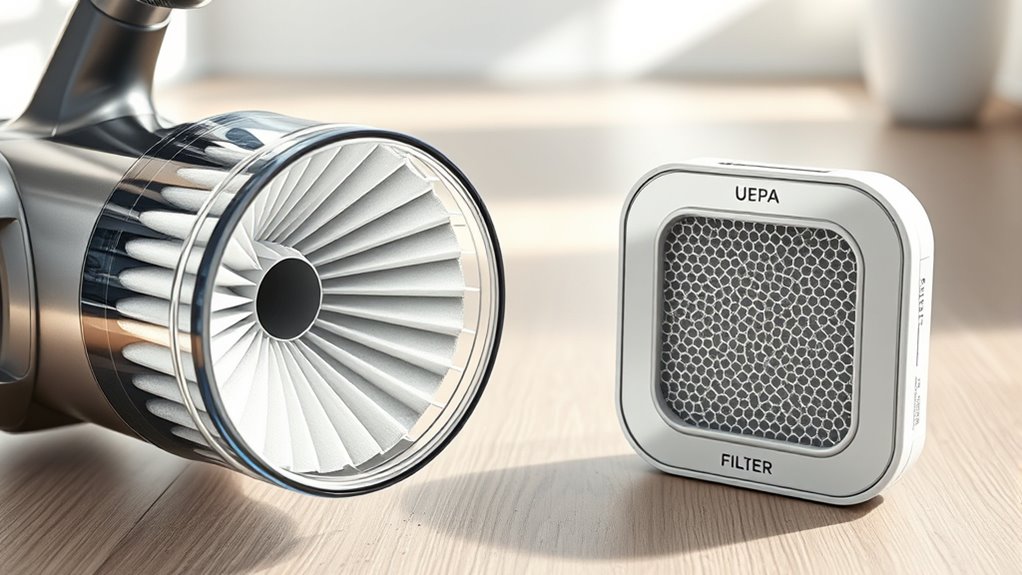
HEPA filters can greatly improve your home’s air purity by capturing allergens and tiny particles. However, you’ll want to think about the ongoing maintenance and costs associated with keeping them effective. Let’s explore the benefits and drawbacks of using HEPA filters for your everyday needs.
Air Purity Improvement
Are HEPA filters effective at improving air purity in your home? Yes, they considerably enhance air purification by capturing tiny particles like dust, pollen, and pet dander, which helps create a cleaner environment. However, their effectiveness depends on maintaining a proper filter lifespan; overused filters can lose efficiency and fail to trap harmful particles. Regularly replacing or cleaning HEPA filters ensures consistent air quality and peak performance. Keep in mind that while HEPA filters excel at removing particles, they don’t address gases or odors, so additional filtration might be necessary for thorough air purification. Overall, investing in quality HEPA filters and adhering to recommended maintenance schedules can make a noticeable difference in the air you breathe daily. Understanding industry trends can also help you choose the best filtration options for your needs.
Allergens and Particles
Wondering if HEPA filters are the right choice for reducing allergens and particles at home? They excel at capturing pet dander, pollen, and dust mites, making them ideal for allergy sufferers. HEPA filters trap tiny particles as small as 0.3 microns, so common airborne allergens are effectively removed from your environment. Additionally, their ability to improve indoor air quality is supported by analytical cookies, which track the efficiency and effectiveness of air purification. However, keep in mind that some allergens, like certain mold spores or volatile organic compounds, may not be fully eliminated. While these filters markedly improve indoor air quality, they don’t eliminate all allergens instantly. Regular filter changes are essential to maintain their effectiveness. Overall, if you’re sensitive to pet dander and pollen allergies, HEPA filters offer a proven advantage by reducing airborne allergens and helping you breathe easier at home.
Maintenance and Costs
Maintaining a HEPA filter system involves regular filter replacements and occasional cleaning, which can add to your ongoing costs. While these filters are effective, they do require you to budget for replacement filters and monitor energy consumption. You’ll need to replace filters every 6 to 12 months, depending on usage, and some models may consume more energy.
| Pros | Cons |
|---|---|
| Improved air quality | Higher ongoing costs |
| Better allergy relief | Increased energy consumption |
| Long-lasting filters | Regular filter replacements needed |
| Low maintenance frequency | Can be more expensive initially |
The Advantages and Limitations of ULPA Filters
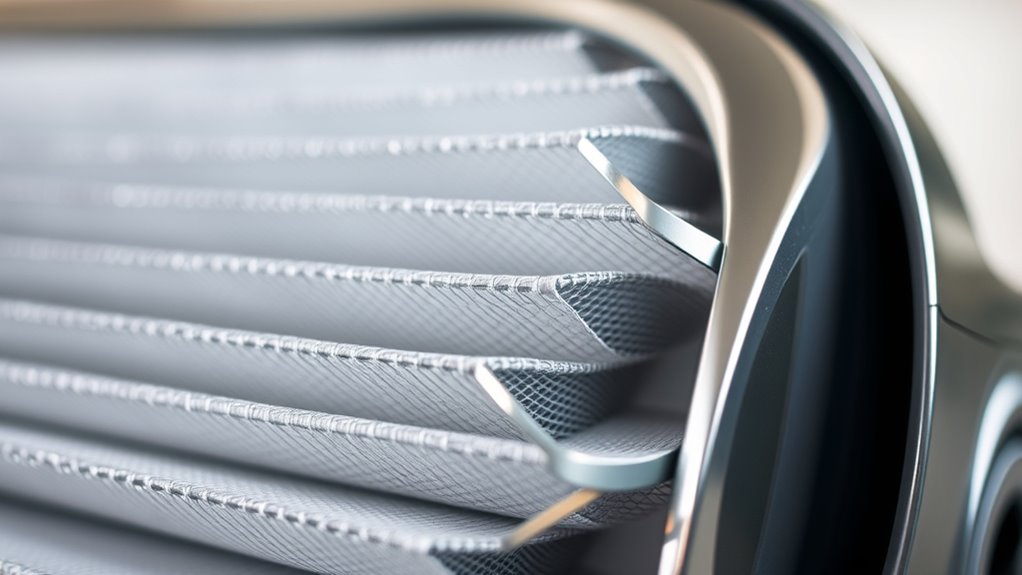
ULPA filters offer significant advantages in environments requiring ultra-clean air, thanks to their ability to trap particles as small as 0.12 microns with efficiency rates exceeding 99.999%. This makes them exceptionally effective against airborne pathogens and other microscopic contaminants, providing a safer, healthier space. However, their high filtration efficiency can also be a limitation. The dense filter media can restrict airflow, which may strain vacuum motors or HVAC systems, leading to increased energy consumption. Additionally, ULPA filters tend to have a shorter filter lifespan compared to HEPA filters, requiring more frequent replacements and higher maintenance costs. While they excel at capturing tiny particles, their cost and sensitivity to airflow restrictions mean they’re best suited for specialized, controlled environments rather than everyday use. SmartCR also highlights the importance of selecting appropriate filtration systems for specific needs.
Environmental and Health Benefits of High-Efficiency Filters
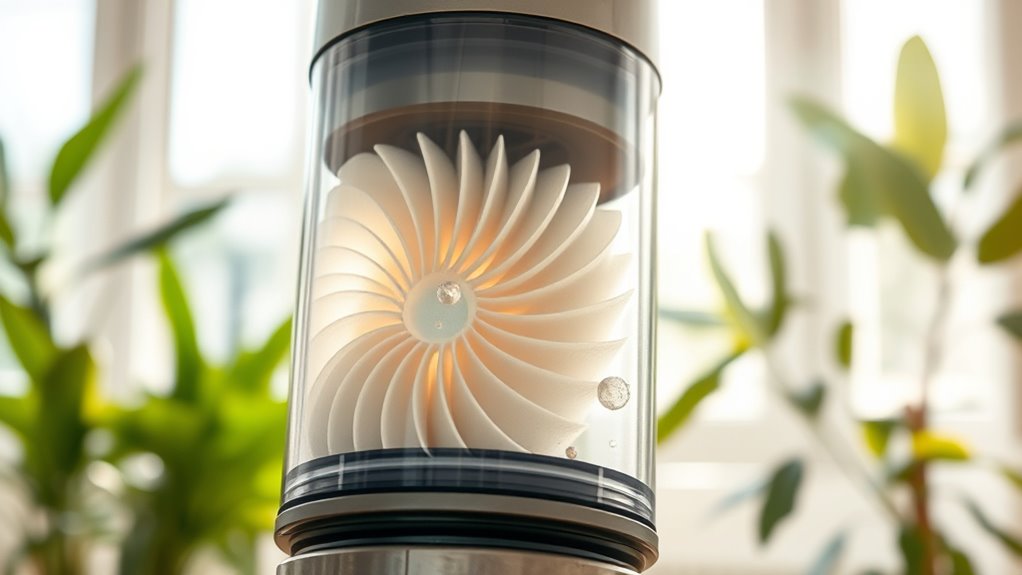
High-efficiency filters like HEPA and ULPA play a crucial role in improving both environmental quality and public health. They effectively reduce airborne contaminants, helping to lower air pollution indoors. By capturing tiny particles, these filters provide considerable allergy relief, especially for dust, pollen, and pet dander.
You benefit from:
- Cleaner indoor air that minimizes respiratory issues
- Reduced exposure to harmful airborne pollutants
- Better overall respiratory health
These filters also help prevent the spread of allergens and bacteria, creating a healthier environment. Using high-efficiency filters can notably improve your indoor air quality, making your space safer and more comfortable. Their ability to trap microscopic particles makes them essential for maintaining a healthier home or office environment. Additionally, understanding AI security vulnerabilities can help in designing safer filtration systems that prevent contamination or malicious interference.
Compatibility and Maintenance Considerations
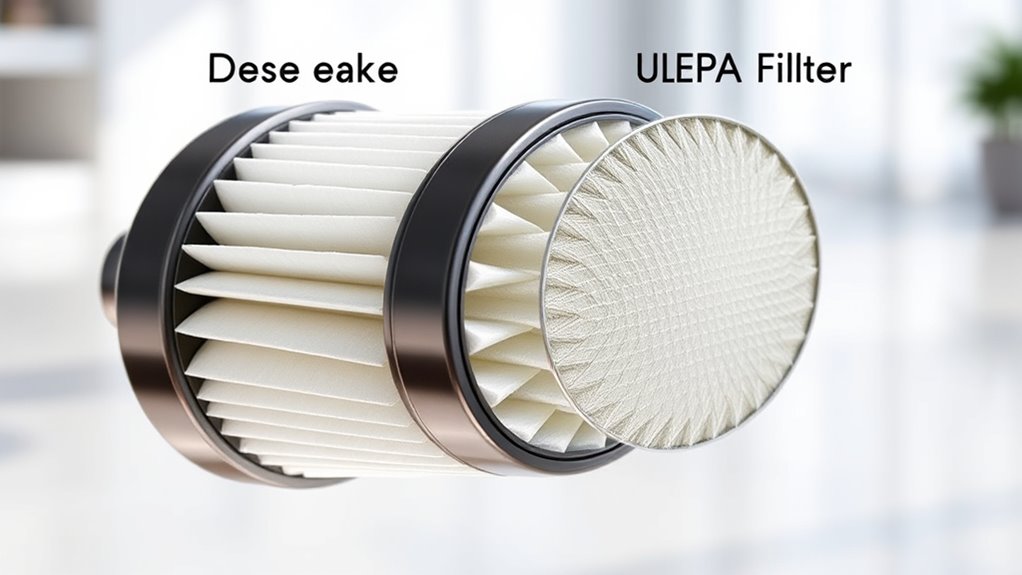
While both HEPA and ULPA filters offer exceptional filtration capabilities, understanding their compatibility with your existing HVAC or air purification systems is vital to guarantee peak performance. Check the installation requirements carefully, as ULPA filters often need more robust housings due to their denser media. Incorrect fit or improper setup can reduce filter lifespan and compromise air quality. Regular maintenance, including timely replacements, is essential to sustain efficiency—consult manufacturer guidelines for recommended replacement intervals. Some systems may require modifications or upgraded filters to handle ULPA filters properly, so ensure your unit supports these higher-efficiency options. Additionally, understanding meditation and its effects on mental clarity can help you maintain a healthy environment conducive to relaxation and well-being. By verifying compatibility and adhering to proper installation requirements, you’ll maximize your filters’ lifespan and maintain optimal indoor air quality.
Cost Comparison: Investing in HEPA Vs ULPA Filters

Investing in HEPA or ULPA filters involves different costs that can substantially impact your budget. When doing a cost analysis, consider both initial purchase price and filter longevity. ULPA filters tend to be more expensive upfront but often last longer due to higher quality materials. Key factors to compare include:
- Initial cost differences between HEPA and ULPA filters
- Expected filter lifespan and replacement frequency
- Maintenance expenses over time
While ULPA filters may seem costly initially, their longer lifespan can reduce long-term expenses. Conversely, HEPA filters are more budget-friendly at the start but might need more frequent replacements, increasing costs over time. Understanding these factors helps you make a smart investment aligned with your cleaning needs and budget constraints.
Myths and Misconceptions About HEPA and ULPA Filters
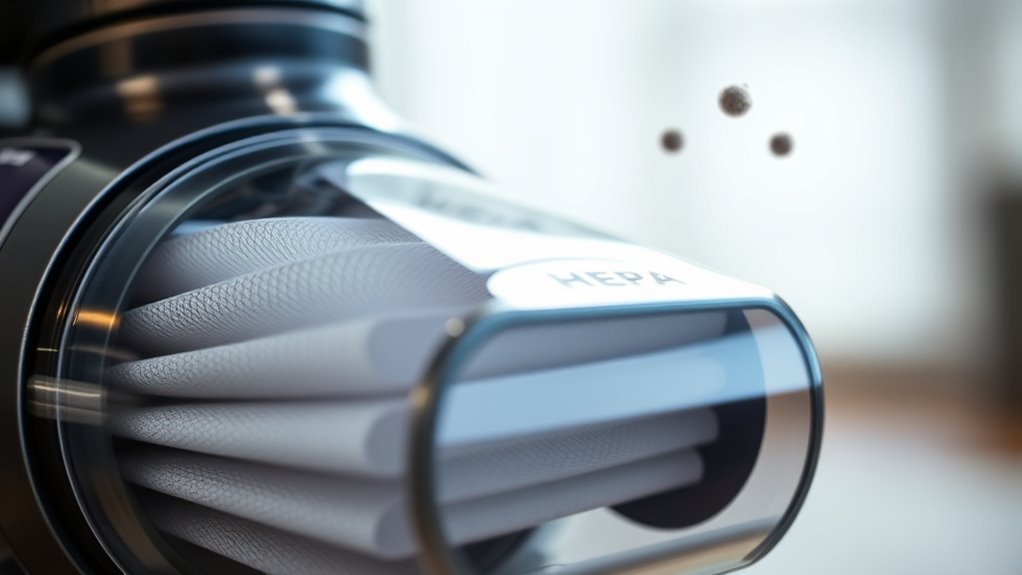
Many people believe that HEPA and ULPA filters are interchangeable or that they offer the same level of filtration, but this is a common misconception. Air purifier myths often lead to confusion about their differences. HEPA filters are designed to trap 99.97% of particles as small as 0.3 microns, while ULPA filters capture even smaller particles, making them more effective for specific needs. However, this doesn’t mean ULPA filters are always better for home use. Some assume filter durability is the same across both types, but ULPA filters tend to have a shorter lifespan due to their denser construction. Understanding these myths helps you choose the right filter for your environment, avoiding unnecessary expenses and ensuring ideal air quality.
Making the Right Choice for Your Home and Air Quality Needs
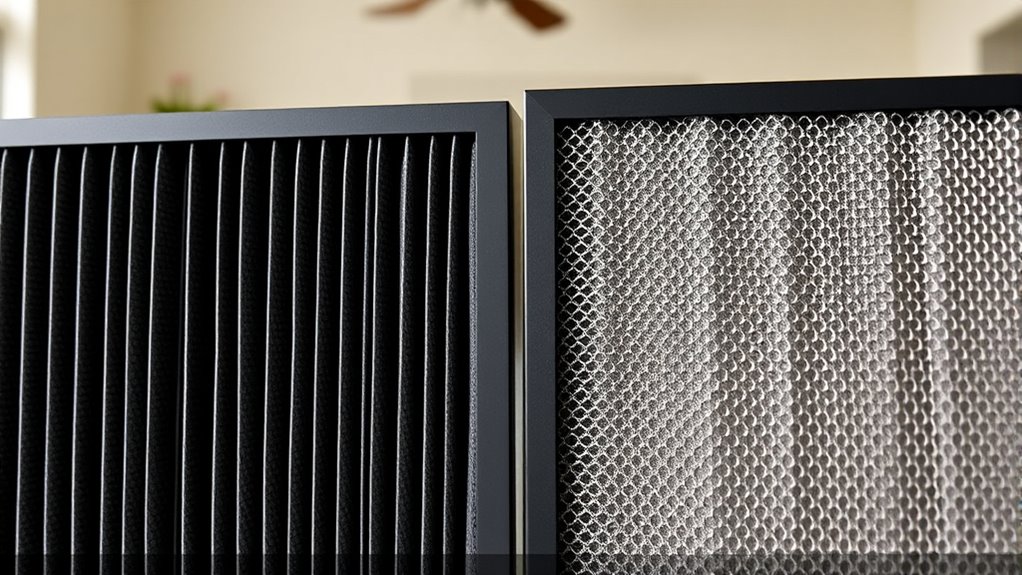
Choosing the right filter for your home depends on understanding your specific air quality needs. Consider what contaminants you want to remove and how often you’ll need filter replacement. When evaluating air purifier brands, look for models that suit your space and target pollutants effectively. To make an informed decision, keep in mind:
- The level of filtration (HEPA vs. ULPA) suited for your environment
- Filter replacement frequency and costs
- Compatibility with your existing vacuum or air purifier system
Frequently Asked Questions
Are ULPA Filters Suitable for Residential Vacuum Cleaners?
Yes, ULPA filters are suitable for residential vacuum cleaners if you want to improve indoor air quality. They effectively trap tiny particles like allergens and bacteria, making your home healthier. However, you need to pay attention to filter maintenance, as ULPA filters require regular cleaning or replacement to stay efficient. Keep up with proper maintenance, and you’ll enjoy cleaner air and a healthier living environment.
How Long Do HEPA and ULPA Filters Typically Last?
Think of HEPA and ULPA filters as your vacuum’s long-term allies. They typically last between 6 to 12 months, depending on usage and air quality. Keep an eye out for replacement indicators like reduced suction or visible dirt buildup—these signals mean it’s time to change the filter. Regularly replacing them guarantees maximum filter lifespan, so your vacuum keeps performing at its best and your air stays clean.
Can HEPA Filters Remove Viruses and Bacteria Effectively?
Yes, HEPA filters can effectively remove viruses and bacteria from airborne pathogens. They are designed with high filtration efficiency, capturing particles as small as 0.3 microns, including many viruses and bacteria. When you use a HEPA filter properly, it reduces the presence of airborne pathogens in your environment, helping you breathe cleaner air. Just remember, maintaining and replacing filters regularly guarantees ideal performance and maximum protection.
Do ULPA Filters Produce Any Harmful Emissions?
Imagine a clear stream filtering debris from the air—that’s what ULPA filters do with airborne particulates. They don’t produce harmful emissions; instead, they trap particles so tiny that they can’t escape back into your space. You won’t notice any strange odors or chemicals from ULPA filter emissions. Instead, they work silently and efficiently, ensuring the air you breathe stays clean and safe without adding any harmful byproducts.
Are There Specific Certifications to Look for in High-Quality Filters?
You should look for filters with proper filter certification, like the HEPA or ULPA marks, to guarantee they meet quality standards. These certifications verify that the filter captures at least 99.97% or 99.999% of particles, respectively. Choosing filters with recognized quality standards guarantees peak performance, reduces allergens, and improves indoor air quality. Always check for certification labels to confirm you’re getting a high-quality, effective filter.
Conclusion
Choosing between HEPA and ULPA filters depends on your air quality needs. HEPA filters remove 99.97% of particles as small as 0.3 microns, making them ideal for most homes. ULPA filters excel at capturing even smaller particles, but come with higher costs and maintenance. Ultimately, understanding their differences helps you make the best choice for safer, cleaner indoor air—since proper filtration can reduce airborne allergens by up to 99%.
